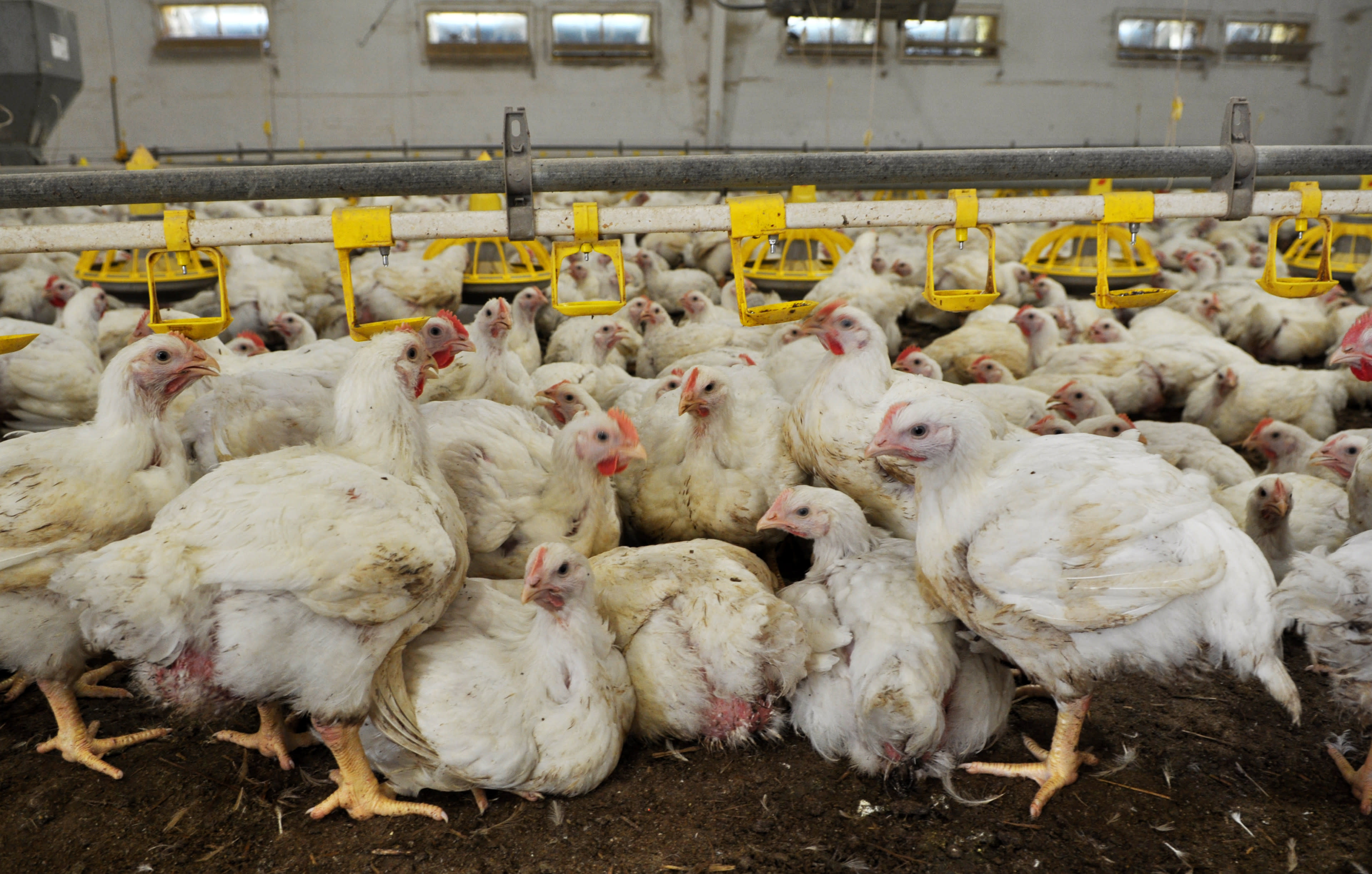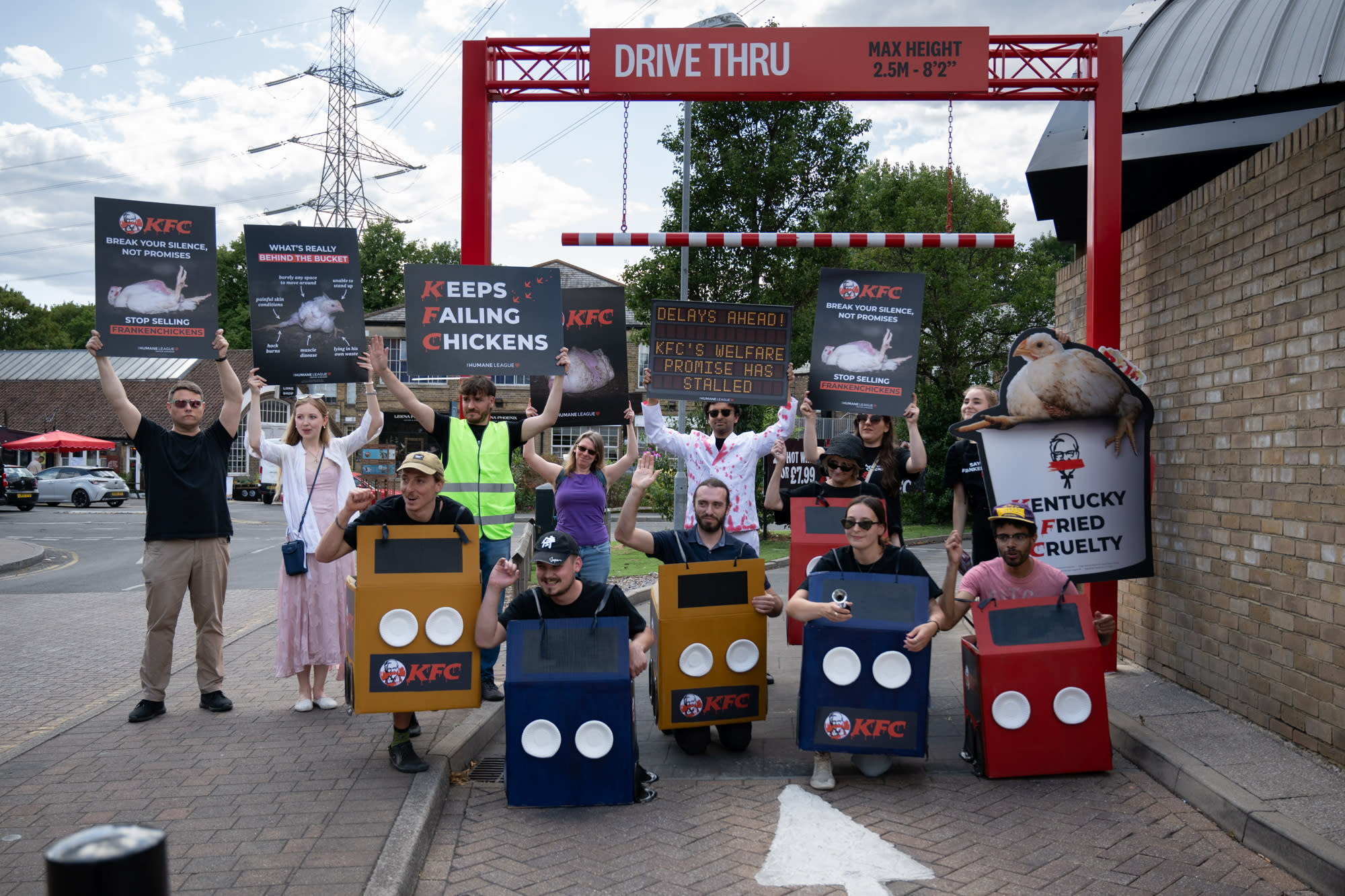




A history of our fight for chickens raised for meat.

There are more chickens raised for meat in the UK than any other farmed animal. Over one billion are killed every year, in an industry dominated by powerful corporations. Fighting to end the worst suffering for these animals is no easy battle, but with chicken becoming an increasingly popular meat it is essential we do not ignore their plight.
When did The Humane League UK start campaigning for chickens raised for meat?
In 2019, after running successful campaigns which saw almost the entire food industry commit to ending the use of eggs from caged hens, The Humane League UK made the decision to campaign even harder on protecting our feathered friends.
There are many different species that suffer in factory farm systems, but chickens do so in huge numbers, and in ways that are coded into their DNA. We knew that campaigns to improve their lives would be critical in the coming years to address arguably the biggest cause of animal suffering in this country.
How did the campaigns begin?
We worked with other animal charities, scientists, and animal welfare experts to agree on a set of standards known as the Better Chicken Commitment (BCC), which significantly improves the lives of broiler chickens. These standards include using slower growing breeds, giving birds more space and natural light, as well as providing enrichment.
The Humane League UK’s first campaigns were focused on restaurants, who had the power to demand better standards from their suppliers. We spoke with buyers, marketing teams, and CEOs to negotiate our first BCC policies from Pret a Manger, Carluccio’s, Ask, and Zizzi.
What about restaurants that put profit before welfare?
When restaurants wouldn’t work with us, we launched hard hitting campaigns, calling them out for their refusal to stop selling meat from ‘Frankenchickens’ - the fast-growing breeds of chickens used as-standard in intensive factory farms across the world.
We, along with our colleagues in the US, launched an ambitious campaign to secure a commitment from global behemoth McDonald’s. We staged protests across McDonald’s flagship restaurants, organised a Ronald McDonald flash-mob outside the HQ, delivered a giant ‘unHappy Meal’ to executives and launched our McGoster video campaign which engaged hundreds of thousands of McDonald’s customers and called out the executives who were putting profit ahead of animal welfare.
One of the most influential early victories for the BCC was when KFC signed up in 2019, having closely followed our hard-hitting McDonald’s campaign. KFC was the first fast-food chain to adopt the BCC and paved the way for others to follow.
In Autumn 2019, we offered the public the opportunity to vote for the restaurant they thought most deserved our Corporate Cruelty Award and the campaign created rapid success! We quickly got Chipotle, Frankie & Benny's, Shake Shack, Chiquito and others to sign up to the BCC.
Subway - the eventual winners of the not-so-prestigious award - were treated to a pan-european campaign, with animal protection groups joining forces across Europe to pressure the brand, which finally committed to the BCC in 2021.
When did Humane League UK start campaigning against supermarkets?
By the end of 2021, we had secured commitments from over 100 brands. Marks & Spencer and Waitrose had both committed to the BCC and it was time to ramp up pressure against the other supermarkets.
Since 2022, the campaign has shone a spotlight on the major supermarkets in the UK selling ‘Frankenchickens’. We’ve worked in collaboration with other animal protection organisations and with support from TV naturalist Chris Packham. We launched mass leafleting and protests against Morrisons, including with support from a brave Morrisons staff member who was fired for his participation in the campaign. We called out a supermarket executive at a conference in front of hundreds of delegates about the company blocking activists on social media. We worked alongside animal protection groups across Europe to pressure Lidl with coordinated protests in many of the countries where they operate.
Since 2022 we have attended every AGM of The Co-op, including tabling a motion to adopt the BCC in 2023, which received 96% support from members, and even disrupting the 2024 event by climbing on stage with banners.
Can fast-growing Frankenchickens be banned?
While robust legislation to explicitly ban the use of fast-growing chicken breeds may be an important part of finally stopping this cruelty in the future, the Humane League UK believes the existing legislation already makes the use of these breeds illegal.
Over the course of 2021 - 2024 we mounted a legal battle to challenge government failings to make use of existing legislation which we believe could prevent the use of ‘Frankenchickens’. While initially unsuccessful on technicalities, the case went through an appeal process and finally got heard in the High Court. Unfortunately the case was lost, again based on technicalities, but in the process a legal breakthrough was made for animals when the Court of Appeal's interpretation clarified and solidified existing legislation which can be used to challenge the use of fast-growing breeds.
What’s next?
Thanks to our supporters, volunteers, and the general public, we’ve made a huge impact for animals, changing the lives of millions of chickens raised for meat.
But it’s not over yet.
Many of the supermarkets in the UK are still refusing to completely end the sale of fast-growing Frankenchickens despite huge amounts of public pressure. If you’d like to be part of our campaign for chickens, as well as our other work to end the abuse of animals raised for food, why not sign up to receive our emails?

 Pru Elliott
Pru Elliott






